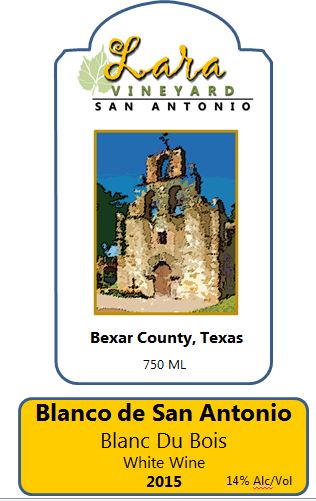Last week, San Antonio Express News reported that a California-based winery named San Antonio Winery brought a trademark suit against a San  Antonio-based winery called Lara Vineyard. In its complaint, San Antonio Winery alleged that Lara Vineyard’s use of the term “San Antonio” as a fanciful name on its labels infringed upon the California winery’s mark. San Antonio Winery has been in business since 1917 and is the owner of the U.S. Trademark Registration for a stylized design mark for the words “San Antonio” for use in connection with wine, the word mark registration for “San Antonio” in connection with wine, as well as several other related marks. The California-based winery has a number of wines containing the name “San Antonio,” such as San Antonio Winery Dessert and San Antonio California Champagne, which the complaint alleges are used in commerce.
Antonio-based winery called Lara Vineyard. In its complaint, San Antonio Winery alleged that Lara Vineyard’s use of the term “San Antonio” as a fanciful name on its labels infringed upon the California winery’s mark. San Antonio Winery has been in business since 1917 and is the owner of the U.S. Trademark Registration for a stylized design mark for the words “San Antonio” for use in connection with wine, the word mark registration for “San Antonio” in connection with wine, as well as several other related marks. The California-based winery has a number of wines containing the name “San Antonio,” such as San Antonio Winery Dessert and San Antonio California Champagne, which the complaint alleges are used in commerce.
In July, TTB approved Certificate of Exemptions for two labels belonging to Lara Vineyard that contain the words “San Antonio,” specifically Blanco Dulce de San Antonio and Blanco de San Antonio. The TTB Certificate of Exemptions indicate that the applicant used the fanciful names “Blanco Dulce de San Antonio” and “Blanco de San Antonio” on the label exemption application. When one examines the actual back label, San Antonio is highlighted as the place of production and bottling. Further, the label also clarifies that the wine is for sale in the state of Texas only. (What is also interesting to note is that the complaint alleges the Lara Vineyard obtained “TTB label approval” with respect to its Blanco Dulce de San Antonio and Blanco de San Antonio wines, but in actuality, Lara Vineyard does not have a Certificate of Label Approval for either of these products because the winery applied for, and was granted, a Certificate of Exemption from TTB due to the fact that Lara Vineyard is currently only selling its wine in the state of Texas. A minor detail, but still important nonetheless.)
According to the complaint, San Antonio Winery was not at issue with Lara Vineyard’s use of the term “San Antonio” with respect to the wine’s geographic origin, i.e., as the appellation. Instead, San Antonio expressed concern over Lara Vineyard’s fanciful names Blanco Dulce de San Antonio and Blanco de San Antonio. Specifically, the California winery alleges in its complaint that Lara Vineyard’s use of “San Antonio” in the fanciful name “will cause consumers to believe that Lara Vineyard’s wines come from San Antonio [Winery] or that Lara Vineyard’s wine is affiliated with, connected with or sponsored or licensed by San Antonio [Winery] and that use of the term SAN ANTONIO in a fanciful name, as a trademark, or part of a trademark in connection with the sale or offer for sale of wine constitutes an infringement of San Antonio [Winery]’s federal trademark rights.” See Civil Action No. S:16-cv-S3. As a result, the Winery claims that Lara’s use of the San Antonio fanciful name constitutes unfair competition under any federal or state trademark or unfair competition laws.
According to San Antonio Express News, Lara Vineyard willingly changed the name on its labels to read “Blanco de San Antonio, Texas,” and “Blanco de Dulce de San Antonio, Texas,” but even though the vineyard took such measures, San Antonio Winery still filed a suit in federal court.
What is interesting to consider is that San Antonio Winery obtained its first USPTO trademark with respect to “San Antonio” and wine in 1933. The very first American Viticultural Area was not approved (federally) until 1980. Even though this particular case does not call into question the use of San Antonio as a place of geographic origin, and even though it is not an American Viticultural Area, it is still interesting to consider how a trademark approval containing a geographically significant name may come into play in this particular case, especially when the trademark was obtained prior to the development of the American Viticultural Area system or a formal U.S. appellation of origin system. For example, there is no doubt that California-based San Antonio Winery has obtained federal trademark rights to the term “San Antonio” with respect to wine. However, will this factor in with respect to the use of the term San Antonio by a winery actually located in San Antonio? How will this court divide the ground between trademarks and geographically significant names, or will it?
The original complaint was filed in the United States District Court Western District of Texas San Antonio Division as Civil Action No. S:16-cv-S3.
For more information on wine or alcohol law, or trademarks, please contact Lindsey Zahn.
DISCLAIMER: This blog post is for general information purposes only, is not intended to constitute legal advice, and no attorney-client relationship results. Please consult your own attorney for legal advice.